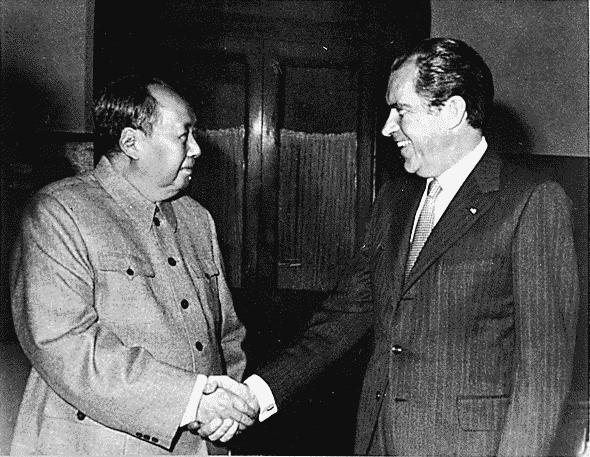Anniversary: Recalling Nixon’s trip to China, 40 years later
President Richard Nixon shakes hands with Chairman Mao Zedong Feb. 21, 1972. Nixon’s landmark visit to China was heavily documented and televised. (Photo coutesy of the the U.S. National Achives.)
Margaret MacMillan, author of the book Nixon and Mao: The Week that Changed the World views President Richard Nixon’s visit to China as a catalyst for change in Sino-American relations.
“It is one of those moments where you remember where you were because it was such an unlikely and previously inconceivable spectacle,” MacMillan said.
In the 1960s, China was not the global super power that it is today, and anti-communist sentiments in the United States hindered diplomacy between the nations. Nixon’s decision to visit with Chinese leaders was considered bold and unexpected.
“Before Nixon started thinking the unthinkable, there was no relationship between the People’s Republic of China and the United States, and there had not been since 1949,” MacMillan said.
For Nixon, there were many perceived benefits to establishing ties with China. Nixon believed the relationship would bolster America’s position in the Cold War by creating a defensive “flank” bordering the Soviet Union. On the Southern front, Nixon hoped that the Chinese could help save the situation in Vietnam where American power was quickly deteriorating.It was also an election year, in 1972, and Nixon believed his proactive efforts at diplomacy abroad would improve his chances for re-election at home.
“On a personal level, it was a very dramatic moment, which helped to portray him as a world statesman on a world stage which was something he very much wanted to do,” MacMillan said.
For China, there were also numerous benefits to establishing a rapport with the United States.During the Cultural Revolution, China had severed ties with many of its neighbors and stood in danger of diplomatic isolation.The Chinese government believed the United States would help bring them back onto the world stage.
According to MacMillan, one of the primary incentives for establishing ties with the United States was Taiwan.
“What the Americans did not realize was that Taiwan was absolutely central in Chinese thinking,” said MacMillan. “From the Chinese point of view, the existence of Taiwan as an independent state out there in the Pacific represents an unfinished part of bringing China back into being a while country again. They wanted the United States to pull all of its troops out of Taiwan, to abrogate its defensive treaty with Taiwan, to cut diplomatic ties with Taiwan.”
Ultimately, the United States did not fully settle on the issue of Taiwan, nor did China rescue the U.S. from defeat in Vietnam.
“I think in a successful negation neither side gets exactly what they want,” MacMillan said. “That is really what happened in ’72, and what both people got out of the Nixon visit was the Soviet Union having to think very carefully before making moves against one or the other.”
The ties established during Nixon’s visit to Beijing set the groundwork for contemporary relations between the U.S. and China. In a blog entry for the New York Times, John F. Burns who covered Nixon’s visit back in 1972 as a foreign correspondent wrote, “The visit brought about the rapprochement between the two great nations that continues to develop today, in awkward fits and starts, and occasional eruptions of distemper.”
MacMillan believes that Nixon’s visit was well-timed but not inevitable.
“I think what that visit did was to establish a relationship where one might not have been established,” MacMillan said. “I mean, it seems so obvious now looking back, that the U.S. and China should have established a relationship…. I don’t think just because the times are ripe for change to occur that change necessarily will happen, I think sometimes it takes human beings to make that come about.”
